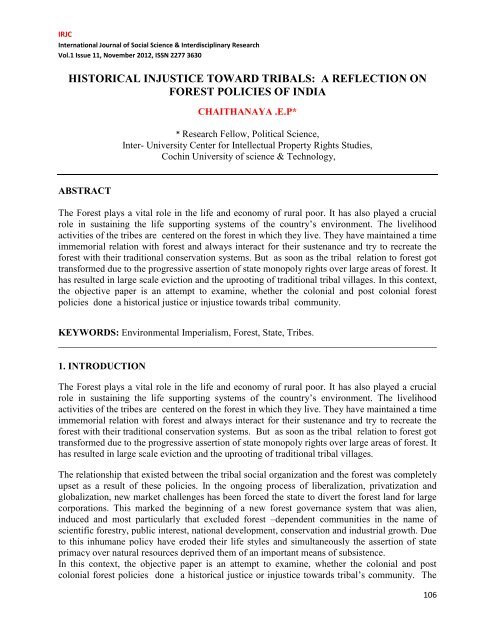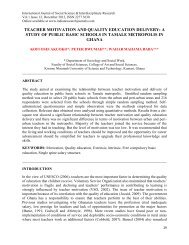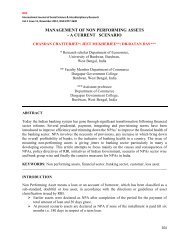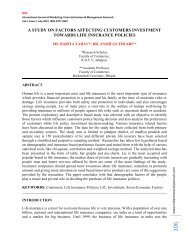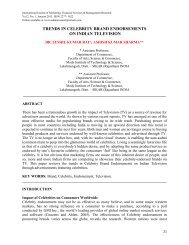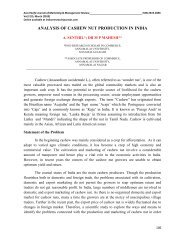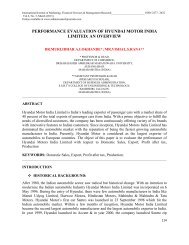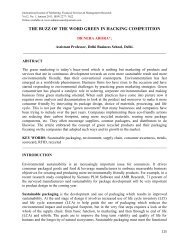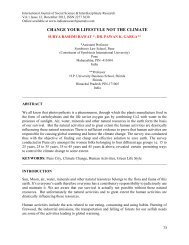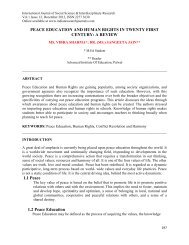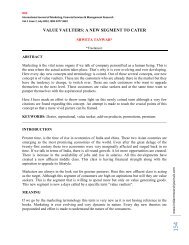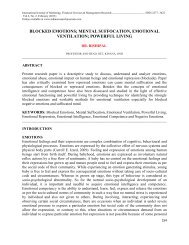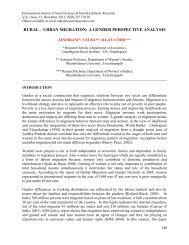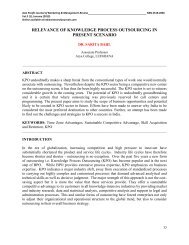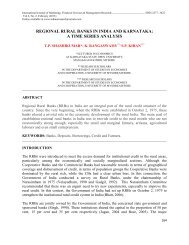historical injustice toward tribals: a reflection on forest policies of india
historical injustice toward tribals: a reflection on forest policies of india
historical injustice toward tribals: a reflection on forest policies of india
Create successful ePaper yourself
Turn your PDF publications into a flip-book with our unique Google optimized e-Paper software.
IRJC<br />
Internati<strong>on</strong>al Journal <strong>of</strong> Social Science & Interdisciplinary Research<br />
Vol.1 Issue 11, November 2012, ISSN 2277 3630<br />
HISTORICAL INJUSTICE TOWARD TRIBALS: A REFLECTION ON<br />
FOREST POLICIES OF INDIA<br />
CHAITHANAYA .E.P*<br />
* Research Fellow, Political Science,<br />
Inter- University Center for Intellectual Property Rights Studies,<br />
Cochin University <strong>of</strong> science & Technology,<br />
ABSTRACT<br />
The Forest plays a vital role in the life and ec<strong>on</strong>omy <strong>of</strong> rural poor. It has also played a crucial<br />
role in sustaining the life supporting systems <strong>of</strong> the country‟s envir<strong>on</strong>ment. The livelihood<br />
activities <strong>of</strong> the tribes are centered <strong>on</strong> the <strong>forest</strong> in which they live. They have maintained a time<br />
immemorial relati<strong>on</strong> with <strong>forest</strong> and always interact for their sustenance and try to recreate the<br />
<strong>forest</strong> with their traditi<strong>on</strong>al c<strong>on</strong>servati<strong>on</strong> systems. But as so<strong>on</strong> as the tribal relati<strong>on</strong> to <strong>forest</strong> got<br />
transformed due to the progressive asserti<strong>on</strong> <strong>of</strong> state m<strong>on</strong>opoly rights over large areas <strong>of</strong> <strong>forest</strong>. It<br />
has resulted in large scale evicti<strong>on</strong> and the uprooting <strong>of</strong> traditi<strong>on</strong>al tribal villages. In this c<strong>on</strong>text,<br />
the objective paper is an attempt to examine, whether the col<strong>on</strong>ial and post col<strong>on</strong>ial <strong>forest</strong><br />
<strong>policies</strong> d<strong>on</strong>e a <str<strong>on</strong>g>historical</str<strong>on</strong>g> justice or <str<strong>on</strong>g>injustice</str<strong>on</strong>g> <str<strong>on</strong>g>toward</str<strong>on</strong>g>s tribal community.<br />
KEYWORDS: Envir<strong>on</strong>mental Imperialism, Forest, State, Tribes.<br />
______________________________________________________________________________<br />
1. INTRODUCTION<br />
The Forest plays a vital role in the life and ec<strong>on</strong>omy <strong>of</strong> rural poor. It has also played a crucial<br />
role in sustaining the life supporting systems <strong>of</strong> the country‟s envir<strong>on</strong>ment. The livelihood<br />
activities <strong>of</strong> the tribes are centered <strong>on</strong> the <strong>forest</strong> in which they live. They have maintained a time<br />
immemorial relati<strong>on</strong> with <strong>forest</strong> and always interact for their sustenance and try to recreate the<br />
<strong>forest</strong> with their traditi<strong>on</strong>al c<strong>on</strong>servati<strong>on</strong> systems. But as so<strong>on</strong> as the tribal relati<strong>on</strong> to <strong>forest</strong> got<br />
transformed due to the progressive asserti<strong>on</strong> <strong>of</strong> state m<strong>on</strong>opoly rights over large areas <strong>of</strong> <strong>forest</strong>. It<br />
has resulted in large scale evicti<strong>on</strong> and the uprooting <strong>of</strong> traditi<strong>on</strong>al tribal villages.<br />
The relati<strong>on</strong>ship that existed between the tribal social organizati<strong>on</strong> and the <strong>forest</strong> was completely<br />
upset as a result <strong>of</strong> these <strong>policies</strong>. In the <strong>on</strong>going process <strong>of</strong> liberalizati<strong>on</strong>, privatizati<strong>on</strong> and<br />
globalizati<strong>on</strong>, new market challenges has been forced the state to divert the <strong>forest</strong> land for large<br />
corporati<strong>on</strong>s. This marked the beginning <strong>of</strong> a new <strong>forest</strong> governance system that was alien,<br />
induced and most particularly that excluded <strong>forest</strong> –dependent communities in the name <strong>of</strong><br />
scientific <strong>forest</strong>ry, public interest, nati<strong>on</strong>al development, c<strong>on</strong>servati<strong>on</strong> and industrial growth. Due<br />
to this inhumane policy have eroded their life styles and simultaneously the asserti<strong>on</strong> <strong>of</strong> state<br />
primacy over natural resources deprived them <strong>of</strong> an important means <strong>of</strong> subsistence.<br />
In this c<strong>on</strong>text, the objective paper is an attempt to examine, whether the col<strong>on</strong>ial and post<br />
col<strong>on</strong>ial <strong>forest</strong> <strong>policies</strong> d<strong>on</strong>e a <str<strong>on</strong>g>historical</str<strong>on</strong>g> justice or <str<strong>on</strong>g>injustice</str<strong>on</strong>g> <str<strong>on</strong>g>toward</str<strong>on</strong>g>s tribal‟s community. The<br />
106
IRJC<br />
Internati<strong>on</strong>al Journal <strong>of</strong> Social Science & Interdisciplinary Research<br />
Vol.1 Issue 11, November 2012, ISSN 2277 3630<br />
first part <strong>of</strong> the paper deals with the role <strong>of</strong> <strong>forest</strong>s in the social-ec<strong>on</strong>omic life <strong>of</strong> tribal‟s and<br />
sec<strong>on</strong>d secti<strong>on</strong>s explains the state c<strong>on</strong>trol over <strong>forest</strong> resources. The third secti<strong>on</strong> deals with the<br />
impact <strong>of</strong> <strong>forest</strong> <strong>policies</strong> <strong>on</strong> tribal‟s and last secti<strong>on</strong>s c<strong>on</strong>tains c<strong>on</strong>clusi<strong>on</strong>s<br />
Role <strong>of</strong> Forest in the Social –Ec<strong>on</strong>omic Life <strong>of</strong> Tribals<br />
Forest is c<strong>on</strong>sidered as <strong>on</strong>e <strong>of</strong> the potential natural resources <strong>of</strong> India. Forest and tribes<br />
have been interdependent and interrelated. They have developed their culture and style <strong>of</strong> life<br />
according to the <strong>forest</strong> because the <strong>forest</strong>s have been fulfilling the needs since time immemorial<br />
(Verma, 2007: 112). The <strong>forest</strong> has maintained the very existence <strong>of</strong> the tribes for centuries.<br />
Tribal culture and <strong>forest</strong>s have been inseparable entities. Forests are fulfilling the social,<br />
ec<strong>on</strong>omic, cultural and religious, political and medical needs <strong>of</strong> tribes moving from pasture to<br />
pasture opening out the country al<strong>on</strong>g fertile valleys and streams (Verma, 2007)<br />
Forests are an important adjunct to tribal culture and ec<strong>on</strong>omy. The life <strong>of</strong> tribal in<br />
mainly based <strong>on</strong> natural resources comprising the primitive methods <strong>of</strong> agriculture and collecti<strong>on</strong><br />
<strong>of</strong> <strong>forest</strong> products. The <strong>forest</strong> has played a significant role in shaping social- ec<strong>on</strong>omic, religious<br />
and cultural systems <strong>of</strong> tribal societies (Ibid, 117). The tribal ec<strong>on</strong>omy is dependent up<strong>on</strong> the<br />
<strong>forest</strong>. Their houses are built by with available <strong>forest</strong> products. The collecti<strong>on</strong> <strong>of</strong> minor <strong>forest</strong><br />
products is still a major ec<strong>on</strong>omic activity <strong>of</strong> the community. They collect <strong>forest</strong> products like<br />
h<strong>on</strong>ey, wax, Lac etc. And they earn wages as <strong>forest</strong> labor. They are dependent up<strong>on</strong> the <strong>forest</strong> for<br />
the medicine and collect medical herbs from the <strong>forest</strong> (Verma, 2007 ).<br />
They had enjoyed the right <strong>of</strong> collecti<strong>on</strong> <strong>of</strong> minor food produce by traditi<strong>on</strong> (Shrivastava,<br />
2007). According to nati<strong>on</strong>al commissi<strong>on</strong> <strong>on</strong> agriculture, they classified the Minor <strong>forest</strong> produce<br />
are bamboo, seeds and c<strong>on</strong>es, oil seeds and gum, resin and other products. Traditi<strong>on</strong>ally, tribes<br />
were dependant <strong>on</strong> the collecti<strong>on</strong> <strong>of</strong> Minor <strong>forest</strong> produce for sustenance as well as<br />
supplementary income. Formally they collected minor <strong>forest</strong> products for their c<strong>on</strong>sumpti<strong>on</strong> and<br />
use and gradually they began to barter the Minor <strong>forest</strong> produce with the neighboring n<strong>on</strong> – tribal<br />
communities. They supplied essential commodities to the tribes in exchange <strong>of</strong> <strong>forest</strong> produce<br />
and agricultural produce. This has introduced competiti<strong>on</strong> am<strong>on</strong>g tribes for more and more <strong>forest</strong><br />
produce and get more and more essential commodities in exchange. Realizing the ec<strong>on</strong>omic<br />
value <strong>of</strong> Minor Forest Produce the traders has introduced cash in a transacti<strong>on</strong> with tribes. The<br />
private traders used to pay very low price for their <strong>forest</strong> products.<br />
The <strong>forest</strong>s are such an integral part <strong>of</strong> the tribal society that tribal society that tribes also<br />
believe that the spirits <strong>of</strong> their ancestors reside in different places in the <strong>forest</strong>. They worship<br />
bushes, trees, animals, birds and sarana groves (Shrivastava, 2007). It is shown how much<br />
tribal‟s depend <strong>on</strong> the <strong>forest</strong>. But this symbiotic relati<strong>on</strong> got transformed due to the introducti<strong>on</strong><br />
<strong>of</strong> <strong>forest</strong> <strong>policies</strong> in the col<strong>on</strong>ial and post –col<strong>on</strong>ial India. The withdrawal <strong>of</strong> tribal rights over<br />
<strong>forest</strong>s and subsequent c<strong>on</strong>versi<strong>on</strong> to reserves and protected <strong>forest</strong> has played a greater role in<br />
degradati<strong>on</strong> <strong>of</strong> the <strong>forest</strong>.<br />
Envir<strong>on</strong>mental Imperialism in Col<strong>on</strong>ial and Post -Col<strong>on</strong>ial India<br />
When we look into the <strong>forest</strong> <strong>policies</strong> <strong>of</strong> India, can be seen two phases- col<strong>on</strong>ial and post<br />
– col<strong>on</strong>ial. Many British ideas and methods <strong>of</strong> rule have been c<strong>on</strong>tinued by post- col<strong>on</strong>ial<br />
governments, especially as India has become more and more hooked into western commercial<br />
107
IRJC<br />
Internati<strong>on</strong>al Journal <strong>of</strong> Social Science & Interdisciplinary Research<br />
Vol.1 Issue 11, November 2012, ISSN 2277 3630<br />
and c<strong>on</strong>sumer systems. Instead <strong>of</strong> rejecting the modernizing <strong>policies</strong> <strong>of</strong> the British and replacing<br />
with them with a more socially and envir<strong>on</strong>mentally sensitive <strong>forest</strong> management strategy, the<br />
post –col<strong>on</strong>ial department actually embraced and enlarged <strong>on</strong> British <strong>policies</strong> (Mullick, 2007)<br />
In the Vedic and epic period the tribes enjoyed full rights and lordship <strong>of</strong> the <strong>forest</strong>s<br />
(Verma, 2007). Within the span <strong>of</strong> the Mauryan period rights over <strong>forest</strong>s were not distributed.<br />
This happy state <strong>of</strong> affairs for the tribal people was not to last forever .From about the middle <strong>of</strong><br />
the 19th century, people from outside began to move into the <strong>forest</strong>, lured by its wealth <strong>of</strong> natural<br />
resources, and the col<strong>on</strong>ial government, sensing the commercial potential <strong>of</strong> <strong>forest</strong>s, gradually<br />
extended its authority over them in the name <strong>of</strong> scientific management (Mathur, 2009). With the<br />
advent <strong>of</strong> the British in India, they realized the commercial value <strong>of</strong> <strong>forest</strong>s. They saw Indian<br />
<strong>forest</strong>s as an important resource to be exploited for the purposes <strong>of</strong> revenue and export.<br />
„C<strong>on</strong>servati<strong>on</strong>‟ <strong>of</strong> <strong>forest</strong>s through a bureaucracy started since the British regime (Pipali, 2007)<br />
The principal aim <strong>of</strong> <strong>forest</strong> policy must be to ensure stability and maintenance <strong>of</strong> ecological<br />
balance including atmospheric equilibrium which is vital for substance <strong>of</strong> all life forms, animal<br />
and plant (Choudari, 2007).<br />
In order to achieve this aim the British gradually brought <strong>forest</strong> areas under their c<strong>on</strong>trol<br />
and <strong>forest</strong> department was organized and <strong>forest</strong> act was enacted. For this purpose, the first <strong>forest</strong><br />
act <strong>of</strong> 1865 was enacted to regulate <strong>forest</strong> exploitati<strong>on</strong> and management and preservati<strong>on</strong>. For the<br />
first time an attempt was made to regulate the collecti<strong>on</strong> <strong>of</strong> <strong>forest</strong> produce by the <strong>forest</strong> dwellers<br />
(Kulkarni, 1987).<br />
The government <strong>of</strong> India thought it was necessary to increase its c<strong>on</strong>trol over <strong>forest</strong>s and<br />
new act was passed in 1878. The act was more comprehensive than earlier <strong>on</strong>e. The entire <strong>forest</strong><br />
areas in the country were classified in to reserve <strong>forest</strong>, protected <strong>forest</strong> and village <strong>forest</strong>. Under<br />
the new system, the traditi<strong>on</strong>al right <strong>of</strong> the tribal people over the <strong>forest</strong> was allowed to maintain<br />
(Kulkarni, 1987). The government was allowed <strong>forest</strong> dwellers to enjoy the rights to some extent<br />
but restricted from owning. The act was applicable <strong>on</strong>ly to the <strong>forest</strong> under c<strong>on</strong>trol <strong>of</strong> the<br />
government and no provisi<strong>on</strong>s were made to cover private <strong>forest</strong>s. This act was followed by five<br />
different successive act passes, in the year 1901 Indian <strong>forest</strong> act , in 1914 the repealing and<br />
amending act 1920 . The devoluti<strong>on</strong> amendment acted in 1927 the Indian <strong>forest</strong>. The last act<br />
elaborately dealt with the different aspects <strong>of</strong> <strong>forest</strong> management and the rights <strong>of</strong> people in the<br />
<strong>forest</strong>. Gradually the government took the c<strong>on</strong>trol <strong>of</strong> over the <strong>forest</strong> and <strong>forest</strong> department with a<br />
view to regulating people‟s c<strong>on</strong>trol over the <strong>forest</strong> lands and produce. (Choudari, 2007)<br />
These legal and policy instruments radically changed the <strong>forest</strong>s from comm<strong>on</strong> property<br />
into state property. It was the beginning <strong>of</strong> the era when the sole motivati<strong>on</strong> <strong>of</strong> <strong>forest</strong><br />
administrati<strong>on</strong> was the promoti<strong>on</strong> <strong>of</strong> state interests. Perhaps, it was also the beginning <strong>of</strong> the<br />
alienati<strong>on</strong> <strong>of</strong> village communities from <strong>forest</strong>. (Balo<strong>on</strong>i 2009)<br />
After the independence, there was some rethinking <strong>on</strong> the issue <strong>of</strong> the <strong>forest</strong> policy. In<br />
1952, the government <strong>of</strong> India was issued a new nati<strong>on</strong>al <strong>forest</strong> policy. It was declared that <strong>forest</strong><br />
policy should be based <strong>on</strong> the paramount nati<strong>on</strong>al needs. It is stated that the use <strong>of</strong> <strong>forest</strong> should<br />
no event be permitted at the cost <strong>of</strong> nati<strong>on</strong>al interests. In actual practice the c<strong>on</strong>cept <strong>of</strong> nati<strong>on</strong>al<br />
interest was interpreted in a very narrow sense. The destructi<strong>on</strong> <strong>of</strong> <strong>forest</strong> for the developmental<br />
projects was justified in the name <strong>of</strong> nati<strong>on</strong>al interest and was discouraged from using the <strong>forest</strong>.<br />
The government tried to obtain more and more revenue from the <strong>forest</strong>. The <strong>forest</strong> <strong>of</strong>ficials <strong>of</strong><br />
India thought mainly <strong>of</strong> increasing the revenue from <strong>forest</strong>s, treating advasis as the enemies <strong>of</strong><br />
the <strong>forest</strong>s (Kulkarni, 1987)<br />
108
IRJC<br />
Internati<strong>on</strong>al Journal <strong>of</strong> Social Science & Interdisciplinary Research<br />
Vol.1 Issue 11, November 2012, ISSN 2277 3630<br />
It is widely criticized that this policy was the mere extensi<strong>on</strong> <strong>of</strong> government authority<br />
over <strong>forest</strong> to the detriment <strong>of</strong> tribal ec<strong>on</strong>omy and life and changes in the rights <strong>of</strong> the tribal<br />
communities over the <strong>forest</strong>. The traditi<strong>on</strong>al rights <strong>of</strong> tribes were no l<strong>on</strong>ger recognized as rights.<br />
The old and new policy when compared dem<strong>on</strong>strated that the „privilege‟ under the old (1894)<br />
became “c<strong>on</strong>cessi<strong>on</strong>” under the new policy (1952). They were later being regarded as<br />
“c<strong>on</strong>cessi<strong>on</strong>”. (Kulkarni, 1987).<br />
The <strong>forest</strong> act <strong>of</strong> 1988 states as its objectives , the maintenance <strong>of</strong> envir<strong>on</strong>mental<br />
stability, c<strong>on</strong>servati<strong>on</strong> <strong>of</strong> the nati<strong>on</strong>al heritage , increase in tree cover, meeting needs <strong>of</strong> the tribes<br />
, encouraging efficient use <strong>of</strong> <strong>forest</strong> produce and af<strong>forest</strong> rati<strong>on</strong> programmers. While this policy<br />
has more people – oriented statements, it still has the c<strong>on</strong>cept <strong>of</strong> exclusive state ownership <strong>of</strong><br />
<strong>forest</strong> and menti<strong>on</strong> industrial needs as nati<strong>on</strong>al needs. (Choudari, 1987).The Forest Act <strong>of</strong> 2006<br />
is the landmark in the evoluti<strong>on</strong> <strong>of</strong> the government‟s attitudes <strong>on</strong> tribal people and their rights. It<br />
attempts not <strong>on</strong>ly to correct a historic <str<strong>on</strong>g>injustice</str<strong>on</strong>g> committed by the col<strong>on</strong>ial and post –col<strong>on</strong>ial<br />
rulers but also vest in <strong>forest</strong> communities as primary role in sustaining <strong>forest</strong> ecosystems by<br />
restoring their rights as well as their envir<strong>on</strong>mental duties. But law basically grants legal<br />
recogniti<strong>on</strong> to the rights <strong>of</strong> traditi<strong>on</strong>al <strong>forest</strong> –dwelling communities, partially correcting the<br />
<str<strong>on</strong>g>injustice</str<strong>on</strong>g> caused by successive <strong>forest</strong> laws in the 19 th and 20 th century. The law will not be able<br />
to resolve tribal people‟s human rights and livelihood issues without similar or greater<br />
advancement in law and administrati<strong>on</strong> in other areas such as land acquisiti<strong>on</strong>, development –<br />
induced displacement and political aut<strong>on</strong>omy.<br />
The greatest value <strong>of</strong> the Forest Act <strong>of</strong> 2006 is that it effectively recognizes the rights <strong>of</strong><br />
<strong>forest</strong> dwellers who previously were c<strong>on</strong>sidered encroaches <strong>on</strong> state land. The Forest Department<br />
had powers to expel them without paying appropriate compensati<strong>on</strong>, and such expulsi<strong>on</strong> had<br />
taken place mainly when they did not have sufficient evidence to prove their right to ancestral<br />
land. The marginalized status <strong>of</strong> <strong>forest</strong> dwellers and other tribal populati<strong>on</strong>s, the powers vested in<br />
Forest Department <strong>of</strong>ficials regarding <strong>forest</strong> management, and the higher political, ec<strong>on</strong>omic,<br />
and social status <strong>of</strong> the rural elite will make it difficult to formulate such a c<strong>on</strong>sultati<strong>on</strong><br />
framework and to apply it ( Perera, 2009)<br />
The struggles over <strong>forest</strong> rights <strong>of</strong> tribal people need to be seen in the broader political<br />
c<strong>on</strong>text, both nati<strong>on</strong>ally and internati<strong>on</strong>ally. When the Forest Act was presented as a bill to the<br />
Parliament in 2005, there was a c<strong>on</strong>scious attempt by several ministries to undermine tribal<br />
community c<strong>on</strong>trol over <strong>forest</strong> resources. A similar attempt by the government to change<br />
envir<strong>on</strong>mental regulati<strong>on</strong>s to facilitate the c<strong>on</strong>structi<strong>on</strong> <strong>of</strong> mines, dams, and industries indicates<br />
the reluctance at the highest political level <str<strong>on</strong>g>toward</str<strong>on</strong>g> <strong>forest</strong> rights to tribal people or to strengthen<br />
their c<strong>on</strong>trol over their ancestral lands in <strong>forest</strong>s. However, the state-capitalist nexus will be a<br />
formidable obstacle to implementing the Forest Act (Perera, 2009).<br />
The questi<strong>on</strong> <strong>of</strong> <strong>forest</strong> rights is related to the modern c<strong>on</strong>cept <strong>of</strong> ownership, but noti<strong>on</strong>s <strong>of</strong><br />
the <strong>forest</strong> people in this regard are quite different. The <strong>forest</strong> is the pivot around which the tribal<br />
life revolves, but for the state, the <strong>forest</strong> is simply a source <strong>of</strong> raw materials for industry and<br />
revenue for itself. In some states the Forest Department is a major source <strong>of</strong> revenue for the<br />
government. It is no w<strong>on</strong>der that successive plans, <strong>policies</strong>, and legislati<strong>on</strong> have resulted in<br />
restricting the rights and usage <strong>of</strong> <strong>forest</strong>s by milli<strong>on</strong>s <strong>of</strong> tribal people for whom <strong>forest</strong>s are their<br />
<strong>on</strong>ly refuge and source <strong>of</strong> sustenance ( Mathur , 2009)<br />
109
IRJC<br />
Internati<strong>on</strong>al Journal <strong>of</strong> Social Science & Interdisciplinary Research<br />
Vol.1 Issue 11, November 2012, ISSN 2277 3630<br />
IMPACT OF FOREST POLICIES ON TRIBAL<br />
Indian <strong>forest</strong> laws enacted in the 19th and 20th centuries treated <strong>forest</strong> dwellers and other<br />
traditi<strong>on</strong>al <strong>forest</strong> users and especially their farming practices such as shifting cultivati<strong>on</strong> as a<br />
threat to <strong>forest</strong> ecology. The British <strong>forest</strong> <strong>policies</strong> were mainly aimed at supplying the raw<br />
material for the British based industries and commercial exploitati<strong>on</strong> <strong>of</strong> <strong>forest</strong> was encouraged at<br />
the cost <strong>of</strong> <str<strong>on</strong>g>tribals</str<strong>on</strong>g> in the name <strong>of</strong> nati<strong>on</strong>al interest. Besides curtailing the various customary<br />
rights over <strong>forest</strong>, as the <strong>forest</strong> resources were mostly collected through c<strong>on</strong>tractors, the tribal‟s<br />
became victims <strong>of</strong> commercial exploitati<strong>on</strong> <strong>of</strong> <strong>forest</strong>s. The different regulati<strong>on</strong>s and restricti<strong>on</strong>s<br />
imposed <strong>on</strong> the <strong>forest</strong> –dwellers and Tribals in the c<strong>on</strong>text <strong>of</strong> exploitati<strong>on</strong> <strong>of</strong> <strong>forest</strong> resources <strong>on</strong><br />
which their ec<strong>on</strong>omy depends to an applicable extent, virtually put them at the mercy <strong>of</strong>,<br />
particularly lower level <strong>of</strong> functi<strong>on</strong>aries.<br />
The genesis <strong>of</strong> the problem <strong>of</strong> encroachment, de<strong>forest</strong>ati<strong>on</strong> and degradati<strong>on</strong> lies in the<br />
process <strong>of</strong> expanding state c<strong>on</strong>trol over <strong>forest</strong>s and the alienati<strong>on</strong> <strong>of</strong> <strong>forest</strong> dwelling communities,<br />
initiated by the British and c<strong>on</strong>tinued with vigor by the state in independent India .The state saw<br />
that the well –being <strong>of</strong> <strong>forest</strong> and <strong>forest</strong> dwellers as two different and mutually exclusive<br />
opti<strong>on</strong>s. This is based <strong>on</strong> a premise that the <strong>forest</strong>s can be well protected <strong>on</strong>ly if the local <strong>forest</strong><br />
using communities are excluded, and that the needs <strong>of</strong> the <strong>forest</strong> dependent communities can be<br />
met <strong>on</strong>ly if society is ready to suffer the loss <strong>of</strong> <strong>forest</strong>. One must choose between these two<br />
alternatives: local communities are enemies <strong>of</strong> the <strong>forest</strong> and the <strong>forest</strong>s have to be protected<br />
from them and the best protecti<strong>on</strong> can be ensured by the tight c<strong>on</strong>trol <strong>of</strong> the state (Parekh and<br />
Parth J Shah, 2002)<br />
The problem <strong>of</strong> encroachment is inherently linked with the basic issue <strong>of</strong> <strong>forest</strong><br />
mismanagement. The mismanagement <strong>of</strong> <strong>forest</strong> has led to the degradati<strong>on</strong> <strong>of</strong> Forest resources<br />
itself. The degradati<strong>on</strong> has been caused by state dominated <strong>forest</strong> management, which has caused<br />
alienati<strong>on</strong> <strong>of</strong> <strong>forest</strong> dwellers from their social and ec<strong>on</strong>omic base (Parekh and Parth J Shah,<br />
2002).<br />
The <strong>forest</strong> department blamed tribal‟s for indiscriminate destructi<strong>on</strong> <strong>of</strong> vegetati<strong>on</strong> and<br />
wildlife and suggested restricti<strong>on</strong> <strong>on</strong> their rights over exploitati<strong>on</strong> <strong>of</strong> <strong>forest</strong>s. Even the collecti<strong>on</strong><br />
<strong>of</strong> raw material for their handicrafts has become difficult and this indiscriminate policy imposed<br />
from time to time has , their rights to collect fuel, fodder and minor <strong>forest</strong> produces are very<br />
much restricted throughout India (Choudari , 2007). The c<strong>on</strong>trol <strong>of</strong> these resources is transferred<br />
from communities to the corporate sector to which they are a source <strong>of</strong> pr<strong>of</strong>it (Choudari ,<br />
2007:14). The policy resp<strong>on</strong>se is to protect <strong>forest</strong>s from the people, particularly <str<strong>on</strong>g>tribals</str<strong>on</strong>g> (<br />
Choudari , 2007).<br />
“Nati<strong>on</strong>al interest” was the log in name and “Development” became the password to have<br />
smooth access to the natural resources <strong>of</strong> the country for their inhuman exploitati<strong>on</strong> and criminal<br />
expropriati<strong>on</strong>. While dams, and mines displaced milli<strong>on</strong>s <strong>of</strong> peasants and tribal‟s and destructi<strong>on</strong><br />
<strong>of</strong> <strong>forest</strong> caused hunger and destituti<strong>on</strong>. Naturally they become ecological refugees with country<br />
who c<strong>on</strong>stitute about <strong>on</strong>e –third <strong>of</strong> Indian populati<strong>on</strong>, were turned into sweet Labors and treated<br />
as the dirt <strong>of</strong> development (Mullick, 2007) .The indigenous people struggle for aut<strong>on</strong>omy and<br />
identity throughout the col<strong>on</strong>ial and post- col<strong>on</strong>ial period demanded state recogniti<strong>on</strong> <strong>of</strong> the<br />
integrity <strong>of</strong> their culture and nature. As far as the tribes are c<strong>on</strong>cerned, the <strong>forest</strong> is inseparable<br />
from their existence, the tribal and <strong>forest</strong> <strong>policies</strong> <strong>of</strong> state could not be framed <strong>on</strong> incompatible<br />
premises. However, this demand was never h<strong>on</strong>ored by the state (Mullick, 2007).<br />
110
IRJC<br />
Internati<strong>on</strong>al Journal <strong>of</strong> Social Science & Interdisciplinary Research<br />
Vol.1 Issue 11, November 2012, ISSN 2277 3630<br />
The government <strong>of</strong> India did not pay much attenti<strong>on</strong> to the tribal people‟s rights or the<br />
need for recognizing their communal rights over <strong>forest</strong> and other comm<strong>on</strong> property resources. As<br />
in the case <strong>of</strong> tribes the state itself dubbed them as encroachers in the state land in order to<br />
protect interests <strong>of</strong> others. The state has occupied many areas which tribes are inhabited from<br />
time immemorial and has classified them as state <strong>forest</strong>s. This kind <strong>of</strong> act from the state itself has<br />
altered the c<strong>on</strong>cept <strong>of</strong> the welfare state.<br />
But the experience <strong>of</strong> implementati<strong>on</strong> <strong>of</strong> the <strong>forest</strong> act in the last five years shows that<br />
neither the government nor the parties have not ready to hand over the power <strong>of</strong> the <strong>forest</strong> –<br />
dwellers and the dependent communities. They do want transformati<strong>on</strong> <strong>of</strong> the <strong>forest</strong><br />
administrati<strong>on</strong> in a manner as envisaged in the legislati<strong>on</strong>. All the incidents very clear point to<br />
the fact that the existing political system is very clear in its intenti<strong>on</strong>s as the government‟s<br />
ec<strong>on</strong>omic <strong>policies</strong> are directed <str<strong>on</strong>g>toward</str<strong>on</strong>g>s selling <strong>of</strong>f the nature and <strong>forest</strong> resources <strong>of</strong> India to the<br />
forces <strong>of</strong> capitalist globalizati<strong>on</strong> (Cadtm, 2011)<br />
Despite the increasing state c<strong>on</strong>trol over <strong>forest</strong> areas in col<strong>on</strong>ial and post –col<strong>on</strong>ial<br />
periods <strong>of</strong> India, <strong>forest</strong> statistics reveal that the total size <strong>of</strong> and quality <strong>of</strong> <strong>forest</strong> have declined<br />
(Mitra and Gupta, 2009). The widely used eminent domain allows the state to acquire private and<br />
comm<strong>on</strong> property for public resources. The eminent domain right has remained supreme,<br />
overriding all other <strong>policies</strong>, laws and regulati<strong>on</strong>s. It is under the right <strong>of</strong> eminent domain at the<br />
state acquires land to build infrastructure, mines, dams and other projects. Communal land will<br />
c<strong>on</strong>tinue to be a site <strong>of</strong> intense c<strong>on</strong>flict between tribal people and the state.<br />
Land and territorial right <strong>of</strong> people <strong>of</strong>ten receive no explicit legal recogniti<strong>on</strong> (Mathur,<br />
2009). When the laws do recognize such rights, they are seldom defended in practice, especially<br />
if they c<strong>on</strong>flict with wider nati<strong>on</strong>al development goals. Despite the oppositi<strong>on</strong>s from tribal<br />
people, the <strong>forest</strong> areas are allocated to corporati<strong>on</strong>s to invest in mining and other projects.<br />
Now community is experiencing a new form <strong>of</strong> encroachment <strong>on</strong> their customary rights<br />
by developmental interventi<strong>on</strong>s such as large dams, mining and c<strong>on</strong>servati<strong>on</strong>. The natural<br />
resource base has been further eroded with increasing de<strong>forest</strong>ati<strong>on</strong> , privatizati<strong>on</strong> <strong>of</strong> the<br />
comm<strong>on</strong>s and drying up <strong>of</strong> rivers through the stranglehold <strong>of</strong> powerful forces both Indian and<br />
foreign , who are exploiting them in an unsustainable way. Tribes c<strong>on</strong>stitute at least 55.16% <strong>of</strong><br />
the total displaced pers<strong>on</strong>s in the country (Mitra and Gupta, 2009). There has been a sustained<br />
and exacerbated threat to the rights <strong>of</strong> tribes to <strong>forest</strong> land that has been both a cause and a<br />
c<strong>on</strong>sequence <strong>of</strong> a larger process <strong>of</strong> political, ec<strong>on</strong>omic and cultural marginalizati<strong>on</strong> <strong>of</strong> the tribes<br />
during the col<strong>on</strong>ial and post col<strong>on</strong>ial eras.<br />
The diversi<strong>on</strong> <strong>of</strong> <strong>forest</strong> land for other purpose in the name <strong>of</strong> developmental project is<br />
posing major threat for the sustenance <strong>of</strong> tribal community. The sancti<strong>on</strong> for the big projects <strong>on</strong><br />
<strong>forest</strong> land was cleared by the government. The Forest Act has empowered the state government<br />
to declare <strong>forest</strong> land as n<strong>on</strong>- <strong>forest</strong> land and to transfer the land later to a private party. Strangely<br />
central government appears to have kept quiet and to have decided not to c<strong>on</strong>test the powers<br />
claimed by the state government.<br />
Tribal people suffer from physical displacement mainly because the laws that do not<br />
recognize communal customary rights <strong>of</strong> people to <strong>forest</strong> lands (Mathur, 2009). The<br />
development projects are ignoring the customary right people over this land and treated them as<br />
illegal occupants <strong>of</strong> government land. Such an approach invariably leads to the improvishment <strong>of</strong><br />
<strong>on</strong>ce settled communities, just opposite <strong>of</strong> what development premises. For the c<strong>on</strong>structi<strong>on</strong> <strong>of</strong><br />
111
IRJC<br />
Internati<strong>on</strong>al Journal <strong>of</strong> Social Science & Interdisciplinary Research<br />
Vol.1 Issue 11, November 2012, ISSN 2277 3630<br />
hydro- electric project, the tribal people were forcibly displaced from their land despite having<br />
legal title to land and no compensati<strong>on</strong> was given to the losing their comm<strong>on</strong> resources.<br />
Tribal people who moved for the developmental projects are impoverished by this loss<br />
<strong>of</strong> access to natural resources. Such improvishment is even more pr<strong>on</strong>ounced when people have<br />
to move from resource rich areas such as those targeted for c<strong>on</strong>servati<strong>on</strong>. The successive<br />
governments have deliberately ignored the importance <strong>of</strong> comm<strong>on</strong> resources in the life <strong>of</strong> <strong>forest</strong><br />
–dwellers and regarded the communal resources as government properties<br />
The c<strong>on</strong>servati<strong>on</strong> and development <strong>of</strong> <strong>forest</strong>s are bound to benefit the tribal communities<br />
and also the entire country. This possible <strong>on</strong>ly when existing regulati<strong>on</strong>s and the prohibitive<br />
nature <strong>of</strong> <strong>forest</strong> legislati<strong>on</strong> is changed. The competiti<strong>on</strong> for scarce resources are being in reality;<br />
a c<strong>on</strong>flict between powerful commercial – industrial interests and powerless tribal communities<br />
(Chaudhuri, 2007). The state policy is <strong>on</strong>ly reflects this unequal situati<strong>on</strong>. There should be a<br />
people – oriented policy that such change will not be affected till power equati<strong>on</strong> is changed in<br />
the favor <strong>of</strong> the tribes and other marginalized communities.<br />
The evicti<strong>on</strong> <strong>of</strong> milli<strong>on</strong>s <strong>of</strong> tribes from their natural habitat is not soluti<strong>on</strong> to the problem<br />
<strong>of</strong> de<strong>forest</strong>ati<strong>on</strong> and degradati<strong>on</strong>. The focus should be <strong>on</strong> devolving rights <strong>of</strong> <strong>forest</strong> dwellers,<br />
who are the <strong>on</strong>ly people who can become good stewards <strong>of</strong> <strong>forest</strong> resources. The gun and guards<br />
approach will not work, whether it is practiced by the machinery <strong>of</strong> the ministry or the judiciary.<br />
Forest dwellers are integral to the <strong>forest</strong> ecology, they are no encroachers (Chaudhuri, 2007).<br />
CONCLUSION<br />
From the experience <strong>of</strong> last 65 years, the growth centric <strong>policies</strong> <strong>of</strong> government have totally neglected the<br />
marginalized communities, who depend up<strong>on</strong> the <strong>forest</strong> and <strong>forest</strong> related resources for their dependence.<br />
The <strong>forest</strong> <strong>policies</strong> <strong>of</strong> state have d<strong>on</strong>e more and more <str<strong>on</strong>g>injustice</str<strong>on</strong>g> <str<strong>on</strong>g>toward</str<strong>on</strong>g>s tribal communities by diverting<br />
their land and their resources for market oriented producti<strong>on</strong> in the name <strong>of</strong> development. Recently passed<br />
the Forest Act <strong>of</strong> 2006 could not alienate the sufferings <strong>of</strong> the tribal community and it has intensified their<br />
struggle. All these acti<strong>on</strong>s are d<strong>on</strong>e without any respect for the <strong>forest</strong> dwellers under the Forest Act. It is<br />
clear that either the government or political parties are not ready to hand over power to <strong>forest</strong> dwellers<br />
and dependent communities.<br />
Acknowledgement<br />
The author would like to thank Pr<strong>of</strong>. (Dr.) N. S. Gopalakrishnan, Director, Inter University<br />
Centre for IPR Studies, Cochin University, <strong>of</strong> Science and Technology;. T. G. Agitha, Research<br />
<strong>of</strong>ficer, Inter University Centre for IPR Studies, Cochin University, <strong>of</strong> Science and Technology;<br />
Nava Kishor Das, the Visiting Fellow <strong>of</strong> the anthropological survey <strong>of</strong> India for their valuable<br />
suggesti<strong>on</strong>s<br />
112
IRJC<br />
Internati<strong>on</strong>al Journal <strong>of</strong> Social Science & Interdisciplinary Research<br />
Vol.1 Issue 11, November 2012, ISSN 2277 3630<br />
References.<br />
1. “India: People‟s <strong>forest</strong> rights rally demanding community rights over natural<br />
resources,‟10 December 2011,Viewed <strong>on</strong> 5 January 2012 ( http://www.cadtm.org/Indiapeople-s-<strong>forest</strong><br />
-rights)<br />
2. “INDIA; S FOREST RIGHTS ACT OF 2006: Illusi<strong>on</strong> or soluti<strong>on</strong>,” 15 December 2006,<br />
viewed <strong>on</strong> 26 December 2011 (www.aitpn.org).<br />
3. Balo<strong>on</strong>i,Kulbhushan(2009),Joint Forest Management In India: The Management Change<br />
Process, viewed <strong>on</strong> 8 February 2011, dspace.iimk.ac.in/bitstream/2259/610/1/balo<strong>on</strong>i.pdf<br />
4. Choudari, Buddhadeb (2007), “Forest and Tribals: A History Review <strong>of</strong> Forest Policy”,<br />
in Chittarajan Kumar Paty, (ed.) Forest Government And Tribe (New Delhi: c<strong>on</strong>cept<br />
publishing company) 1-17<br />
5. Hiremath, S.R (2009),Who Owns India‟s natural resources – Community Or<br />
Government?,viewed<strong>on</strong>4June2011(http://www.panjab.org.uk/english/ownership%20<strong>of</strong>%<br />
20resources.htm<br />
6. In Tropical Forest”, 18 October2011, (http:// www.ibcperu.org/doc/isis/6255.)<br />
Kulkarni, Sharad (1985),Forest Legislati<strong>on</strong> and Tribals: Comments <strong>on</strong> Forest Policy<br />
Resoluti<strong>on</strong>, 12 December 1987, viewed <strong>on</strong> 20 December 2011(http://www.jstor<br />
.org/stable/4377847)<br />
7. Mathur, Mohan Hari(2009),Tribal Land Issues in India: Communal Management, Rights,<br />
and Displacement, viewed <strong>on</strong> 29 November 2011, (http://<br />
www.adb.org/Documents/Books/Land-Cultural.../chap06.pd)<br />
8. Mithra, Kinsuk and Radhika(2009),Indigenous Peoples' Forest Tenure in India, viewed<br />
<strong>on</strong> 29 November, 2011, (http://www.adb.org/Documents/Books/Land-<br />
Cultural.../chap07.pdf)<br />
9. Mullick Bosu, Sanjay (2007),“State Forest Policy and Adivasi Self Rule in Jharkhand” in<br />
Paty Kumar, Chittarajan Kumar Paty (ed.) Forest Government And Tribe (New Delhi:<br />
c<strong>on</strong>cept publishing company) 18- 29<br />
10. Parekh,Trupti (2002),Keepers <strong>of</strong> Forest : Foresters or Forest Dwellers?, viewed <strong>on</strong> 18<br />
December 2011 (ccs<strong>india</strong>.org/pdf/terra-<strong>forest</strong>-dwellers-versus-<strong>forest</strong>ers.pdf)<br />
113
IRJC<br />
Internati<strong>on</strong>al Journal <strong>of</strong> Social Science & Interdisciplinary Research<br />
Vol.1 Issue 11, November 2012, ISSN 2277 3630<br />
11. Patnaik, sanjoy( 2007) ,PESA ,The Forest Rights Act, and Tribal Rights In India, Viewed<br />
<strong>on</strong> 5 January 2012 (http://www.mtnforum.org/en/c<strong>on</strong>tent/pesa-<strong>forest</strong>-rights-act-andtribal-rights-<strong>india</strong>)<br />
12. Paty Kumar, Chittarajan, ed. (2007): Forest Government And Tribe (New Delhi: c<strong>on</strong>cept<br />
publishing company)<br />
13. Perera, Jayantha (2009),Scheduled Tribes and other traditi<strong>on</strong>al <strong>forest</strong> dwellers<br />
(Recogniti<strong>on</strong> <strong>of</strong> <strong>forest</strong> rights) act 2006: A charter <strong>of</strong> <strong>forest</strong> dwellers rights, viewed <strong>on</strong> 10<br />
October 2011(www.<strong>forest</strong>rightsact.com/the-act)<br />
14. Pipali ,Dipak ( 2007) , “ Forest And Development: Anthropological Perspectives” in Paty<br />
Kumar, Chittarajan Kumar Paty (ed) Forest Government And Tribe (New Delhi: c<strong>on</strong>cept<br />
publishing company) 132-137<br />
15. Sarin, Madhu (2005),Scheduled Tribes Bill 2005: A Comment, 21 May 2005, viewed <strong>on</strong><br />
19 December 2011(http://www.jstor .org/stable/4416663)<br />
16. Tresierra, Julio C (1999), Rights <strong>of</strong> Indigenous Groups over Natural Resources<br />
17. Verma Kumar, Asok (2007),“Forest as the Material Basis <strong>of</strong> Tribal Society during<br />
Col<strong>on</strong>ial Period” in Chittarajan Kumar Paty (ed) Forest Government And Tribe (New<br />
Delhi: c<strong>on</strong>cept publishing company) 113-122<br />
114


